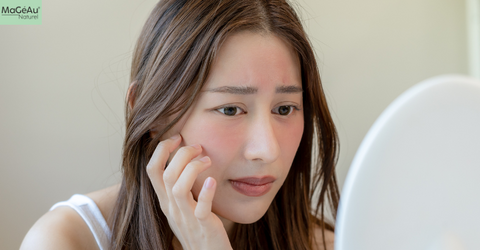Going through radiation therapy can be tough, and one of the biggest challenges people face is dealing with skin sensitivity and burns. If you or someone you love is undergoing radiation treatment, you may already be feeling the effects, redness, irritation, peeling, or even painful burns on the skin. These side effects can make everyday life uncomfortable, but with the right care, you can ease the discomfort and protect your skin.
In this guide, we will explore ways to care for radiation burns and sensitive skin, focusing on practical tips and gentle products that can help.
What Happens to the Skin During Radiation Therapy?
Radiation therapy targets cancer cells, but it can also affect the healthy skin surrounding the treatment area. Many patients experience redness, dryness, peeling, and even open sores. The severity varies from person to person, but some common issues include:
- Dryness and peeling – The skin loses moisture, making it flaky and rough.
- Redness and irritation – The skin may look like a sunburn and feel sore.
- Itching and discomfort – Constant irritation can make it hard to sleep or focus on daily activities.
- Increased sensitivity – Skin may react more easily to temperature changes, clothing, and skincare products.
- Blistering and wounds – In severe cases, the skin can break down and become painful.
Many people don’t realise that these effects can last even after the treatment ends, sometimes for weeks or even months. That’s why taking good care of your skin is essential.
How to Care for Radiation Burns and Sensitive Skin
1. Keep the Skin Clean (But Gently!)
When your skin is already irritated, regular soaps and cleansers can make things worse. Harsh chemicals and fragrances can strip away moisture and lead to more dryness and peeling. Instead, use a gentle facial cleanser and a hydrating shower gel that are free from sulphates, alcohol, and artificial fragrances.
Recommended Products:
Gentle Facial Cleanser – Look for one with soothing ingredients like magnesium, vitamin E, and jojoba oil.
Hydrating Shower Gel – Opt for a shower gel that contains grape seed oil, vitamin E and natural oils to keep the skin soft and comfortable.
2. Moisturise, Moisturise, Moisturise
Radiation therapy can cause severe dryness, so keeping the skin hydrated is key. You’ll need both a body lotion and a hand lotion that deeply nourishes the skin without causing further irritation. Avoid lotions with alcohol, artificial fragrances, or strong preservatives, as they can make the skin feel even more uncomfortable.
Recommended Products:
Body Lotion – Choose one with aloe vera, cacao butter, and vitamin E to help restore the skin barrier.
Hand Lotion – Since hands often become dry and cracked, look for a lotion with natural ingredients like jojoba oil, cacao butter, or magnesium to keep them soft.
3. Avoid Hot Water
Hot water can strip the skin of natural oils and make sensitivity worse. When showering or washing your face, stick to lukewarm or cool water. Short showers are best, and always pat your skin dry gently with a soft towel—never rub it!
4. Wear Loose and Soft Clothing
Tight, rough fabrics can cause further irritation. Choose breathable, soft clothing made from cotton or bamboo. Avoid synthetic fabrics that can trap heat and cause sweating, which may worsen irritation.
5. Stay Out of the Sun
Radiation-treated skin is extremely sensitive to UV rays. Even short periods of sun exposure can make the irritation worse. If you need to go outside, wear loose, long-sleeved clothing and a wide-brimmed hat. Sunscreen can also help, but make sure to choose a mineral-based formula with zinc oxide or titanium dioxide, as chemical sunscreens may cause more irritation.
6. Don’t Scratch or Pick at the Skin
Peeling and itching can be frustrating, but scratching will only make things worse. If itching becomes unbearable, try applying a cool compress or using a mild, fragrance-free hydrating mist to calm the skin.
7. Avoid Harsh Ingredients
Many people unknowingly use products that contain harsh ingredients, making their skin even more sensitive. Watch out for these common irritants:
- Alcohol (drying and irritating)
- Artificial fragrances (can trigger reactions)
- Sulphates (harsh cleansing agents that strip moisture)
- Parabens (potential irritants for sensitive skin)
- Retinol or AHAs/BHAs (can be too strong for compromised skin)
8. Keep the Skin Hydrated from Within
Drinking plenty of water and eating foods rich in omega-3 fatty acids (like salmon, walnuts, and flaxseeds) can help support skin repair from the inside out.
9. Follow Your Doctor’s Advice
Your medical team may have specific recommendations based on your treatment plan. Always follow their guidance, especially if they prescribe special creams or dressings for severe burns.
What Most People Don’t Know About Radiation Skin Care
Many people assume that once radiation therapy ends, their skin will heal quickly. However, skin sensitivity can last for months, and without proper care, it can take even longer to recover. Another lesser-known fact is that some over-the-counter healing creams contain ingredients that can actually worsen irritation, so always check the label or consult your doctor before using anything new.
Effective Care Tips for Radiation Burns and Sensitive Skin
Caring for radiation burns and sensitive skin can feel overwhelming, but the right approach can make a huge difference. Using a gentle facial cleanser, a hydrating shower gel, a nourishing body lotion, and a soothing hand lotion can help keep your skin comfortable and protected.
Remember, be kind to your skin, avoid irritants, and give it the time it needs to heal. If you have any concerns, always check with your doctor or a skincare specialist for advice tailored to your specific needs.
By following these simple steps, you can ease discomfort and help your skin recover more smoothly. Stay patient, stay hydrated, and most importantly, take care of yourself!





Comments (0)
There are no comments for this article. Be the first one to leave a message!